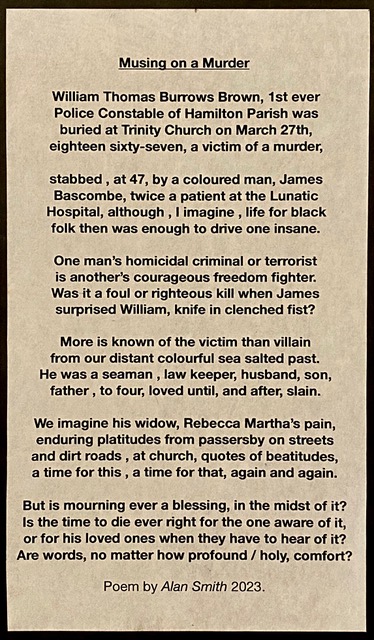 Retired Det/Supt George Rose
Retired Det/Supt George Rose
Over 150 years ago in 1867, Police Constable Brown was murdered in Bermuda during the course of carrying out his duties. Although the name of Constable Brown(e) appears at the very top of the Bermuda Police Roll of Honour which lists the names of those officers who have died in service, the detailed circumstances surrounding his death have hitherto remained unknown.
 In Memory of Those Who Died in Service
In Memory of Those Who Died in Service
Until now, that is, when fellow EXPO researcher and retired Inspector John Skinner discovered in the Bermuda Archives that Constable Brown had been – “killed in the execution of his duty” – in March 1867. This handwritten information was recorded within the Pensions section of one of the books entitled the Annual Income and Expenditure of the Government of the Colony of Bermuda – more commonly known as the Blue Books.
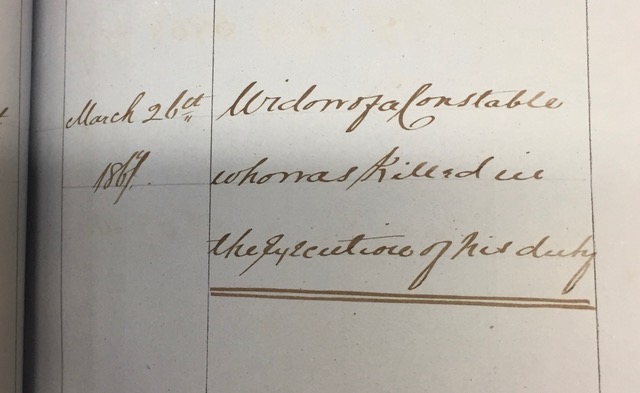
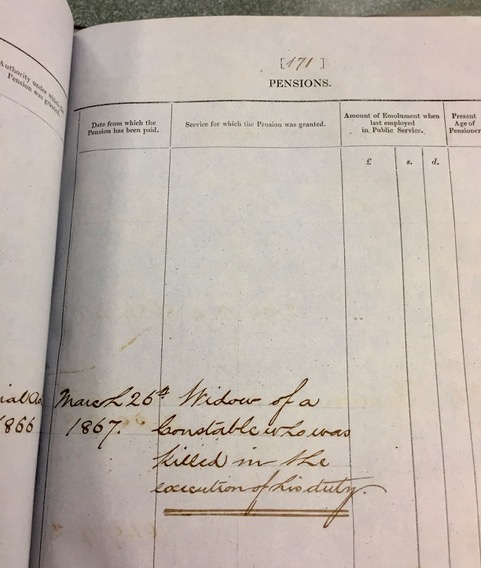
In 1867 Rural Constable Thomas Burrows Browne (sic) became the first Bermudian officer to die in the execution of his duty. While trying to recapture an escaped prisoner, the man stabbed him and the Constable later died from an infection. Despite this tragic event, for which the assailant was committed to the local lunatic asylum, the Island generally remained free of serious crime.
Relying on the contents of the above information I conducted follow-up research using the Bermuda Library Digital Collection in an attempt to uncover details of Constable Brown’s murder. I discovered that on Tuesday, March 26, 1867 the Bermuda Royal Gazette reported as follows on the ‘STABBING AFFAIR IN HAMILTON PARISH’.
“Of this shocking affair we have been placed in possession of the following particulars: –
James Bascome – twice a patient in the *Lunatic Hospital, and from which he was discharged in October last – was brought before the Worshipful T.W. Mercer, Esq., on Monday the 18th instance by Constable F. Wood of Smith’s Parish, charged with being in the Store of Mr. Benjamin Paynter, at the Flatts’ Village, with a six-barrel revolver concealed in the right sleeve of his coat. Wood stated that his attention was drawn to the circumstance by Paynter, who had become alarmed at finding Bascome thus armed, knowing his character.
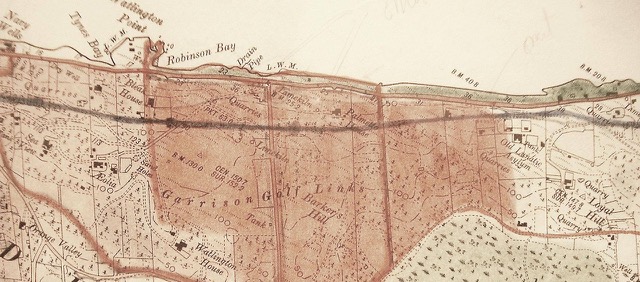 The "Lunatic Hospital" where James Bascome was a patient was
The "Lunatic Hospital" where James Bascome was a patient was
“That on his (Wood) taking possession of the pistol, Bascome caught him by the throat. Wood then summoned Mr. Samuel Doe to assist him in taking Bascome to Mr. Mercer’s office. Mr. Mercer thought it necessary to call in a brother Magistrate, the Worshipful Samuel C. Outerbridge. After hearing the evidence of Constable Wood, the Magistrates decided on committing Bascome under remand, as it was known that there were at least three persons who would depose to them being in bodily fear of him.
“The Magistrates, therefore, issued a Warrant of Committal until 10 o’clock on Thursday following, but instead of Constable Wood taking him directly to Hamilton gaol as required by the Warrant, he allowed Bascome to go to the residence of his mother, some one or two miles out of his way, and when he got there he set Wood and his authority at defiance.
“Wood then called to his aid Constable Brown, and they both entered a room pointed out to them as the one in which Bascome had secreted himself. As soon as they did so Bascome sprang from his place of concealment on Brown, and stabbed him in the right side immediately over the lung. Fortunately the wound, though dangerous, is not of so severe a nature as it doubtless would have been had not the instrument used been checked in its progress by coming in contact with one his ribs.
“Brown says he did not see Bascome till he felt the blow.
“We are pleased at being able to add that Mr. Brown was considered better by his Medical attendant last evening, though still unable to depose as to the circumstances of the case.
“Mr. Browne (sic) is an exceedingly useful man in the Parish of Hamilton, and his loss would be much felt.
“Bascome was recaptured on Friday and lodged in Hamilton gaol.”
Some days later, on Tuesday, April 2, 1867 The Bermuda Royal Gazette informed the Bermuda public that Constable Brown had died of his injuries and that a Coroner’s inquest had returned a verdict of ‘Wilful Murder’ against the killer.
“We are truly sorry to learn that Constable Brown, of Hamilton Parish, who was stabbed on Monday week by the coloured man Bascome, as mentioned in our last issue, died from the effects of the wound on Tuesday last.
“An inquest having been held by C. C. Keane, Esq., Coroner, a verdict of “Wilful Murder” was returned.
“Brown has left a wife and five children, who were entirely dependent on his labour for support. We are told that the Coroner and the Jurors unanimously gave their fees to the unfortunate widow, and subscription lists have been opened for the same laudable purpose in different parts of the island.”
On Tuesday, May 7, 1867 The Bermuda Royal Gazette informed that on the previous day at the Easter Session of the Bermuda Court of General Assize before the Honorable John Harvey Darrell, Chief Justice, and the Honorable Joseph Wood, Assistant Judge, Presiding. [After opening prayers]
“…………..The Court soon after assembled, and the Grand Jury, of which Thomas F. J. Tucker, Esq., was chosen Foreman, being empaneled, His Honor the Chief Justice delivered the following Charge:–
‘Mr. Foreman and Gentlemen of the Grand Jury I am sorry to find that the Criminal Calendar for the present Assize is more heavy than usual, and that it comprehends several cases of a very serious nature.
‘The first to which I shall direct your attention, is a charge against a coloured man residing in Hamilton Parish, for the alleged murder of a Constable, who was aiding another Constable in endeavoring to apprehend the prisoner and convey him to gaol, in obedience to an Order from the Magistrates. This prisoner was formerly a patient in the *Pauper Lunatic Hospital, from which he had some-time since been discharged; and a question will naturally arise whether he was not insane at the time of inflicting the wound, from the effects of which it is alleged the Constable afterwards died.
‘But if the evidence brought before you shall lead to the conclusion that the prisoner is the person who wounded the Constable, and that the death resulted from that wound, you will find the Bill of Indictment against the prisoner, without entering upon any enquiry whether he was then insane or not; inasmuch as that question will more properly come under investigation at a subsequent stage of the proceedings, in the event of your finding the Bill against him.
‘There is another charge for a Capital crime founded on an accusation against a private soldier of having committed a rape; and there are two charges against other persons for alleged attempts at a similar offence.
‘In all these cases it will be incumbent on you carefully to scrutinize the evidence of the complainants, and to inquire in each case whether that testimony is so far corroborated by circumstances proved by other witnesses, as to satisfy you of the truth of the accusation, and that the imputed violence was really committed against the will of the party complaining; for unless the evidence should be such as to raise a reasonable presumption of the want of consent you ought not to find these Bills of Indictment.
‘As many as five complaints for feloniously stabbing or cutting with dangerous weapons will be brought before you.
‘It is very lamentable to observe the increased frequency of crimes of this class, in the colony, within the last few years. It would seem as if the wild habits of the reckless people who resorted here in such numbers during the blockade of the Southern ports of America in the years 1864 and 65, had taken a hold in the country which has not yet entirely past away, and were still producing effects very detrimental to the peace and welfare of the community.”
One week later on Monday, May 13, 1867 at the Easter Session before the same Justices of the Bermuda Court of General Assize there appeared the following cause mention as reported in The Bermuda Royal Gazette the following day:
“The Queen ag. James Bascome. Murder True Bill Tried.
(The Jury in this case kept together from Wednesday to Saturday, and did not agree a Verdict – one of the Jury being taken ill on Saturday, and being reported by a Medical gentleman to be too ill to perform his duty as a Juror, the Jury was discharged, and another empaneled to try the case.)
Note. – Bascome’s case is now before a 2nd Jury.”
The following week on Monday, May 20, 1867 at the same Easter Session and before the same Justices the case was again mentioned when it was reported the next day by The Bermuda Royal Gazette that –
“James Bascome’s case is probably unprecedented in the annals of our Jurisprudence, and it may be doubted whether such a case has appeared elsewhere. Two Juries having entered on the trial of the prisoner were discharged without giving any verdict, neither of them being able to agree.
“The prisoner was indicted for the Wilful Murder of a Parish Constable, William Thomas Burrows Brown, who received a mortal wound while endeavoring to arrest Bascome.”
“The former trial commenced on Wednesday morning, the 8th instant, and Thursday afternoon, the 9th, at 3.0 p.m., the Jury retired to consider the case.
“On Saturday, the 11th, it was reported to the Court that one of the Jurors was taken ill, and a medical gentleman having been called in to visit the ill man certified [to] the Court that he was unable to act longer as a Juror, and thereupon the Court discharged the Jury without its giving any Verdict, at ½ past 11 in the forenoon, and remanded the prisoner to Gaol.
“On Monday morning, the 13th, at 9.30, or soon after, a second Jury was empaneled, to try the case, and the second trial lasted until 7 p.m. the next day, when the Jury retired to consider its verdict. This second Jury was not more fortunate than the former one, for after remaining out until 4.0 p.m., on Saturday, the 18th, which was the last day of the Assizes, the Foreman announced that there was no probability of its agreeing to a verdict, and the Court, in consideration of the near approach of the close of the Session, discharged the second Jury, and again remanded the prisoner. He therefore still remains for trial.
“The Court stands adjourned to Monday, the 3rd proximo, at 11 o’clock.”
As will have been noticed by reports during this month of May, it is apparent that the Royal Gazette newspaper was only published every Tuesday in those far off days and it is recorded that one item had advised that the Gazette had bumped the proceedings of the House in favour of advertising. It is reasonably likely to think that the same policy had been adopted in the reporting of court cases whereby if they got too old they were likely omitted altogether.
Nevertheless, The Bermuda Royal Gazette reported as follows in their Tuesday, November 12, 1867 issue that on the previous day at the Michaelmas Term of the Bermuda Court of General Assize before the Honorable John H. Darrell, Chief Justice, and the Honorable Eugenius Harvey, Assistant Judge, Presiding.
“The Queen vs James Bascome – Murder – Tried, and found not guilty on account of his insanity at the time of the commission of the offence.”
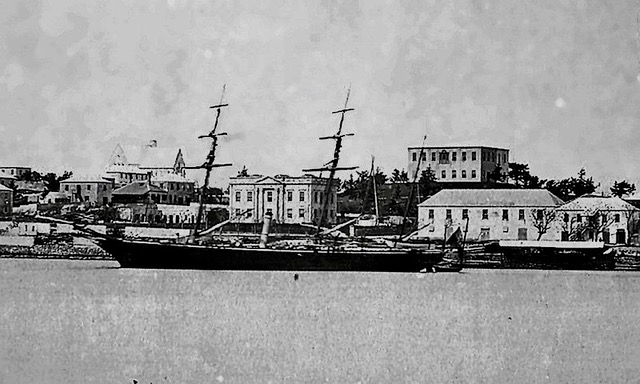 View of Hamilton in 1868 by Arthur Green
View of Hamilton in 1868 by Arthur GreenThere are as yet unconfirmed and somewhat confusing accounts on line that Constable William Thomas Burrows Brown was born in Bermuda in 1820 as the eldest son and 4th child of Adam John Meek Brown (1782-1872) and Grace Sandiford (1793-1876) whom he married in 1814. Adam J. M. Brown is thought to have been a shipbuilder in Hamilton Parish and is believed to have been of Scottish ancestry.
Constable Browne [note the change in spelling, as William Thomas Browne is said to have added the ‘e’ on to his last name and used it consistently] married Rebecca Martha Webb in 1841 in Bermuda and together they had raised 7 children.
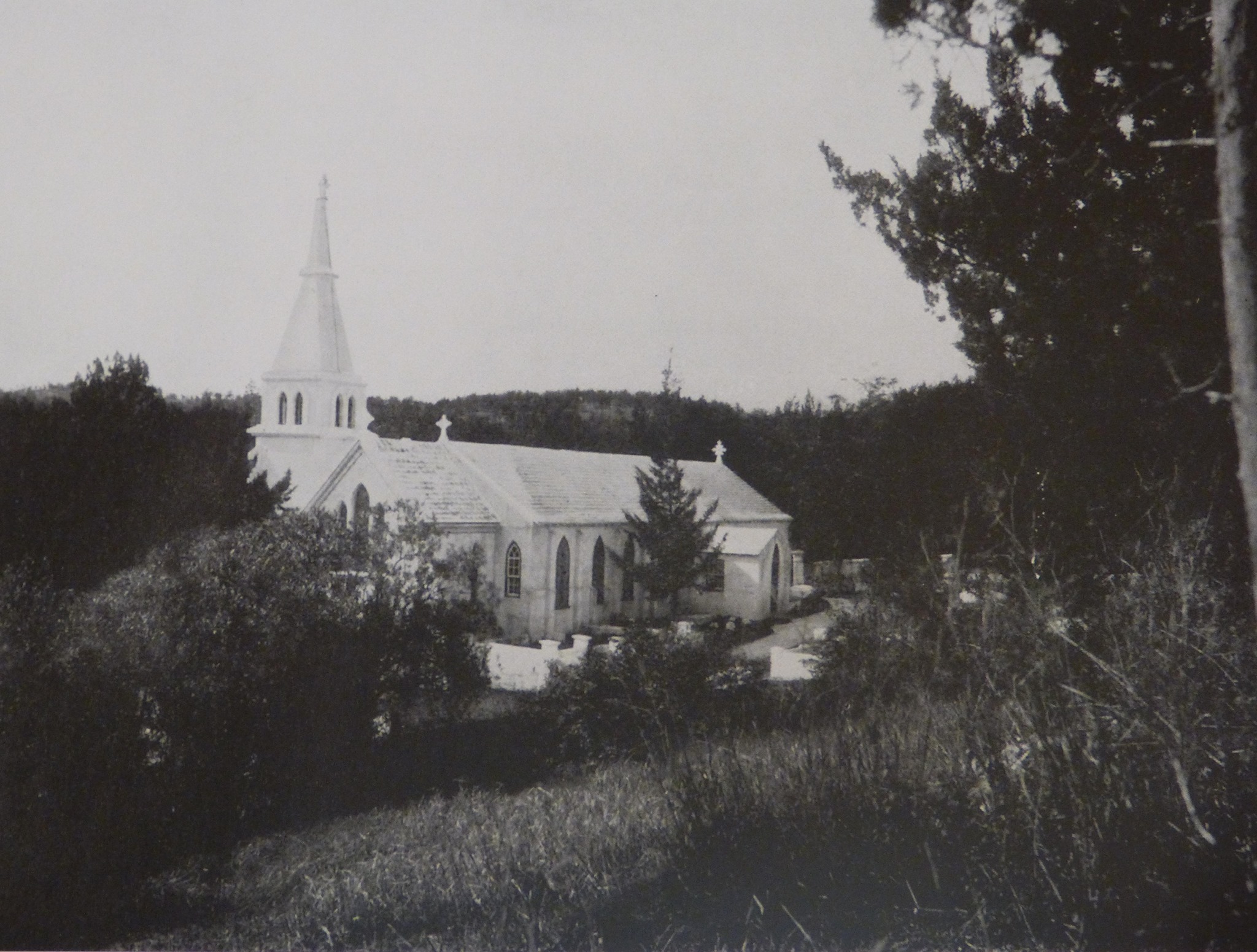 Holy Trinity Church, Hamilton Parish
Holy Trinity Church, Hamilton Parish
Parish records examined at the Bermuda National Library show that Constable Browne was buried in the cemetery grounds at the Holy Trinity Church, Trinity Church Road, Hamilton Parish, Bermuda. I’ve made prolonged enquiries with church vestry staff in an effort to locate the burial site in the hope that an inscribed gravestone could be located which may have revealed useful information and also thereby have provided the opportunity for a commemorative police experience.
Sadly, this exercise has thus far been to no avail. The most abiding explanation given is that because of a protracted re-numbering of the graves some 13 years ago the exact location of the plot cannot now be ascertained and has probably been lost forever.
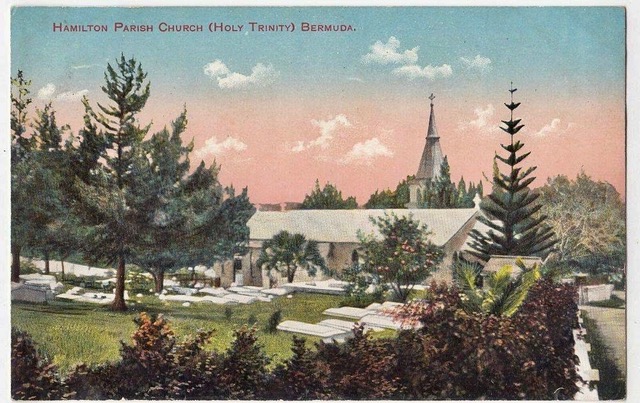 Holy Trinity Church, Hamilton Parish
Holy Trinity Church, Hamilton Parish
15th June 2020
Editors note - It is most unlikely that we will ever find a photograph or likeness of Constable William Thomas Burrows Brown(e), but we are hoping that we may find one or more of his descendants if any are still here in Bermuda, or elsewhere. George Rose is currently following a line of enquiry which might hopefully trace descendants of his family. If you can assist in any way please contact our website at info@expobermuda.com
We were also looking for an old photograph of Holy Trinity Church, along with an old photo of the Sessions House pre-1900 which we believe housed the Court of Assize, or Supreme Court, where James Bascome was tried twice before being found not guilty on the grounds of insanity. Within a few hours of publishing an appeal on the website 'Bermuda History: Our Island; Our Heritage', we received the above images of both the Sessions House and Nelmes photo of Holy Trinity Church kindly submitted by Gerri Crockwell to whom we are most indebted.
Gerri also kindly provided information about the "Pauper Lunatic Hospital" where James Bascome had been treated prior to this matter going before the court, and he was probably returned to the hospital after his trial. The "Lunatic Hospital" as it was then called was built on a piece of 7 acre property on the North Shore in Devonshire in 1846 and was used for 22 years before being moved to the former Devonshire College Building.
We thought at first it was likely that the Lunatic Hospital was the building later used as a military hospital which still stands on Palmetto Road just to the east of the Tyne's Bay incinerator, but Seán Pòl Ó Creachmhaoil then kindly produced an extract from the Savage Ordnance Survey Map from the 1890's showing the site of the "Old Lunatic Asylum" just off the North Shore in Devonshire. Seán also provided us with additional photos of Holy Trinity Church and other landmarks, while Linda Esch, also a contributor to 'Bermuda History: Our Island, Our Heritage' has reported that the old building still exists on Long Range Hill in Devonshire.
George Rose and I are both extremely grateful for and most impressed by the assistance we received from contributors to the 'Bermuda History: Our Island, Our History' website. It is clearly an invaluable resource for anyone studying the history of Bermuda, and I for one will be calling on the website again whenever we are conducting research and we need assistance. Many thanks to all concerned for your assistance on this project.
27th June 2020
EDITORS NOTE - George Rose continued his efforts to locate the exact site of the old "Lunatic Hospital/Asylum" as it was then called, and has just provided this additional information about exacty where it was located:-
"Extended enquiries to trace the exact location of the Lunatic Asylum resulted in me making a walking visit to the site in company with a knowledgeable member of the Cox family living nearby who explained that after demolition of the Asylum it was replaced by a three-storey building conventionally known as the Incubator.
